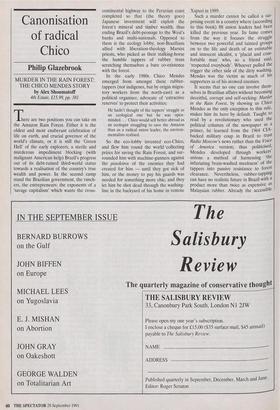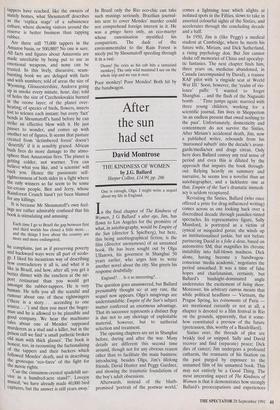Canonisation of radical Chico
Philip Glazebrook
MURDER IN THE RAIN FOREST: THE CHICO MENDES STORY by Alex Shoumatoff 4th Estate, £15.99, pp. 381 here are two positions you can take on the Amazon Rain Forest. Either it is the oldest and most exuberant celebration of life on earth, and crucial governor of the world's climate, or it is still the 'Green Hell' of the early explorers, a sterile and murderous impediment blocking (with malignant American help) Brazil's progress out of its debt-ruined third-world status towards a realisation of the country's true wealth and power. In the second camp stand the Brazilian government, the ranch- ers, the entrepreneurs: the exponents of a `savage capitalism' which wants the cross-
continental highway to the Peruvian coast completed so that (the theory goes) Japanese investment will exploit the forest's mineral and timber wealth, thus ending Brazil's debt-peonage to the West's banks and multi-nationals. Opposed to them is the ecology lobby, non-Brazilians allied with liberation-theology Marxist priests, who picked as their stalking-horse the humble tappers of rubber trees scratching themselves a bare co-existence with the forest.
In the early 1980s Chico Mendes emerged from amongst these rubber- tappers (not indigenes, but by origin migra- tory workers from the north-east) as a political organiser, advocate of 'extractive reserves' to protect their activities:
He hadn't thought of the tappers' struggle as an ecological one but he was open- minded... Chico would sell better abroad as an ecologist struggling to save the Amazon than as a radical union leader, the environ- mentalists realised.
So the eco-lobby invented eco-Chico, and flew him round the world 'collecting prizes for saving the Rain Forest, and sur- rounded him with machine-gunners against the pistoleiros of the enemies they had created for him — until they got sick of him, or the money to pay his guards was needed for something more chic, and they let him be shot dead through the washing- line in the backyard of his home in remote
Xapuri in 1989.
Such a murder cannot be called a sur- prising event in a country where (according to this book) 88 union leaders had been killed the previous year. Its fame comes from the way it focuses the struggle between two powerful and tainted groups on to the life and death of an estimable and innocent idealist, a 'placid and com- fortable man' who, so a friend said, `respected everybody'. Whoever pulled the trigger the other side of the dirty washing, Mendes was the victim as much of his supporters as of his avowed enemies.
It seems that no one can involve them- selves in Brazilian affairs without becoming deceitful, corrupt and self-seeking: Murder in the Rain Forest, by showing us Chico Mendes as the only exception to this rule, makes him its hero by default. Taught to read by a revolutionary who used the political columns of the newspaper as a primer, he learned from the 1964 CIA- backed military coup in Brazil to trust Radio Moscow's news rather than the Voice of America version; thus politicised, Mendes developed through workers' unions a method of harnessing 'the infuriating brain-washed meekness' of the tappers into passive resistance to forest clearance. Nevertheless, rubber-tapping can have no realistic future in Brazil with a product more than twice as expensive as Malaysian rubber. Already the accessible
tappers have reached, like the owners of stately homes, what Shoumatoff describes as the 'replica stage' of a subsistence culture, where showing visitors around the reserve is better business than tapping rubber,
Are there still 75,000 tappers in the Amazon basin, or 500,000? No one is sure. All facts and figures about Amazonia are made unreliable by being put to use as emotional weapons, and none can be trusted. In this lively, discursive, seam- bursting book we are deluged with facts and with numbers; told of areas the size of Wyoming, Gloucestershire, Andorra going LIP in smoke every minute, hour, day; told of holes the size of Czechoslovakia burned in the ozone layer; of the planet over- heating; of species of birds, flowers, insects lost to science each instant: but every 'fact' bends in Shoumatoffs hand before he can strike an effective blow with it. He just pauses to wonder, and comes up with another set of figures. It seems that pasture created from `detimbered forest' doesn't `decertify' if it is sensibly grazed. African bush fires do more damage to the atmo- sphere than Amazonian fires. The planet is getting colder, not warmer. You can believe what you like, and 'a scientist' will back you. Hence the passionate self- righteousness of both sides in a fight where the only winners so far seem to be some ice-cream people, Ben and Jerry, whose Rainforest Crunch hasn't yet been blamed for any killings.
It is because Mr Shoumatoffs own feel- ings are rather admirably confused that his book is stimulating and amusing:
Each time I go to Brazil the gap between first and third worlds has closed a little more.. and the things I love about the country are more and more endangered, he complains, just as if preserving poverty and backward ways were all part of ecolo- gY. I liked his incautious way of describing how contradictory it all is, and what it is like in Brazil, and how, after all, you get a better dinner with the ranchers at the air- port restaurant than you would get amongst the rubber-tappers. He is very human. He tells you all the scandal and rumour about one of these rightwingers (`there is a story. . . according to one source... ') and then you meet the bogey- man and he is allowed to be plausible and good company. We hear the machismo tales about one of Mendes' supposed murderers as a stud and a killer, but in the prison cell we find 'a small pathetic broken old man with thick glasses', The book is honest, too, in recounting the factionalising of the tappers and their backers which followed Mendes' death, and in describing the grotesque `eco-farce' of the fight for the movie rights. Can the cinnamon-crested spadebill sur- vive in a hundred-acre stand?', Lovejoy mused; 'we have already made 40,000 bird captures, but the answer is still years away.' In Brazil only the Rio eco-chic can take such musings seriously. Brazilian journal- ists sent to cover Mendes' murder could not comprehend foreign interest in it. He was a gringo hero only, an eco-martyr whose canonisation mystified his compatriots. The dash of the environmentalist to the Rain Forest is nicely put by Shoumatoff speeding through it in a taxi: Damn! [he cries as his cab hits a tamarind monkey]. The only wild mammal I see on the whole trip and we run it over.
Poor monkey! Poor Mendes! Both hit by the bandwagon.



































































 Previous page
Previous page